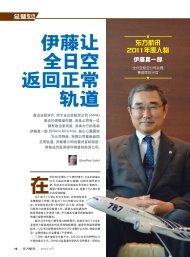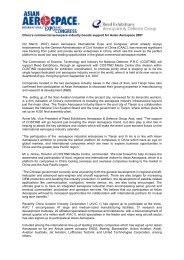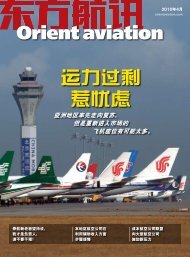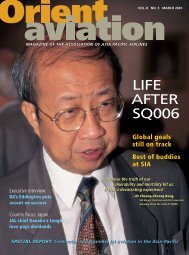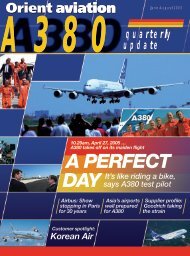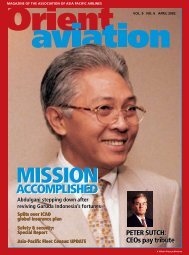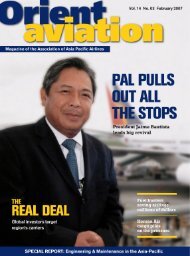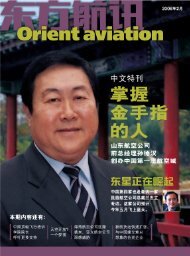Fleet Census - Orient Aviation
Fleet Census - Orient Aviation
Fleet Census - Orient Aviation
You also want an ePaper? Increase the reach of your titles
YUMPU automatically turns print PDFs into web optimized ePapers that Google loves.
British Airways chief executive Willie<br />
Walsh knows only too well how officialdom<br />
can muddy the waters when it comes to<br />
environmental matters. Head of the only<br />
airline participating in a voluntary emissions<br />
trading scheme, he is also paying a staggering<br />
US$772 million a year to the British<br />
government in Air Passenger Duty (APD),<br />
a tax introduced on the back of lobbyists’<br />
demands over environmental issues.<br />
Walsh is furious about a decision taken in<br />
December – it came into effect on February 1<br />
– which doubles APD from $9.65 to $19.30.<br />
Speaking to <strong>Orient</strong> <strong>Aviation</strong> in Tokyo, where<br />
he was attending a meeting of oneworld alliance<br />
CEOs, the fiery Irish-born airline chief<br />
was happy to prove he has done his sums.<br />
“If you look at our [BA’s] total CO 2<br />
production, which is 16.1 million tonnes of<br />
CO 2 a year, and if you look at the current<br />
price of CO 2, which is about eight Euro<br />
($10.50) per tonne, you can work out the<br />
figure yourself,” he said.<br />
“That $772 million would offset our total<br />
CO 2 production four times. Passengers today<br />
need to understand that governments – and<br />
particularly the U.K. government – are<br />
taxing them in the name of environmental<br />
performance that goes way in excess of the<br />
actual environmental impact of the airline.”<br />
It is the sort of scenario airlines fear: that<br />
more taxes and charges will be levied, with<br />
the industry being used as a bank to provide<br />
funds for the fight against global warming,<br />
even though airlines are a minor contributor<br />
to the problem.<br />
Walsh and IATA want green taxes to be<br />
replaced by emissions trading schemes written<br />
with internationally accepted guidelines.<br />
They may be on the verge of achieving their<br />
goal.<br />
Walsh was speaking just days after a<br />
landmark two-week meeting of ICAO’s<br />
Committee on <strong>Aviation</strong> Environmental<br />
Protection (CAEP) which finally came up<br />
with a consensus on guidelines countries can<br />
use to incorporate international aviation into<br />
emissions trading schemes.<br />
These guidelines will go to the 36th<br />
Assembly of ICAO – a division of the United<br />
Nations – in Montreal this September, where<br />
it is hoped governments will give them a<br />
stamp of approval. Then it will be up to<br />
individual countries to determine how they<br />
should be implemented.<br />
Walsh welcomed the breakthrough, as did<br />
IATA director general, Giovanni Bisignani.<br />
“We’re pleased that ICAO has echoed<br />
IATA’s call urging states not to jump the<br />
gun on emissions trading, but to wait for<br />
the ICAO Assembly’s recommendations<br />
in September,” said Bisignani. “Unilateral<br />
action by states is not the answer. We need<br />
a global approach that provides a level playing<br />
field for airlines and avoids competitive<br />
distortions.”<br />
The IATA chief’s comments were later<br />
taken up by the organisation’s communications<br />
director, Tony Concil. “As an industry<br />
we are against taxes and charges. However,<br />
if there are economic measures that need<br />
to be taken, a properly designed emissions<br />
trading scheme probably offers the best way<br />
forward,” he said.<br />
‘The industry as a whole has<br />
to consciously guard against<br />
being cast as the whipping boy<br />
for other agendas’<br />
Chew Choon Seng<br />
Chief Executive<br />
Singapore Airlines<br />
How would that be defined? “The<br />
first thing would be that it is globally<br />
harmonized,” said Concil. “This doesn’t<br />
mean we want to have one scheme for the<br />
entire world.<br />
“Rather, all airlines should be treated in<br />
the same way once governments have chosen<br />
which scheme to introduce.<br />
“We wouldn’t want to have the Australian<br />
government say aviation has to buy 100% of<br />
its permits and aviation needs to pay $150<br />
per permit, then have the European Union<br />
say you can get 50% of your permits free and<br />
we’re going to charge you 10 Euros for the<br />
remainder. That would create a playing field<br />
that was not level,” he said.<br />
The fear that a number of governments<br />
may go it alone is not unfounded. Some<br />
authorities have even suggested trading<br />
schemes that would apply only to airlines,<br />
a move that is firmly resisted by IATA. It<br />
believes there must be a multi-industry<br />
emissions market.<br />
The European Parliament originally<br />
drafted a “closed, aviation-only” emissions<br />
trading scheme. However, the final proposal<br />
saw an enormous change in the way aviation<br />
will be treated, with a far more level playing<br />
field. It also recognized that ICAO is likely<br />
to come up with global standards.<br />
Some airlines are strongly against<br />
emissions trading, but they still prefer it<br />
to draconian taxation. “If governments are<br />
going to impose an environmental tax, the<br />
result has to be that making the industry more<br />
expensive is going to deter people from flying<br />
and we don’t think that’s a good thing,” said<br />
Concil. “Emissions trading on the other hand<br />
offers an incentive to be more fuel efficient<br />
and to invest in new technology.”<br />
The new guidelines focus on those aspects<br />
of emissions trading related to issues specific<br />
to aviation and provide preferred options<br />
for the trading systems. In essence, they lay<br />
down rules for how emissions are counted for<br />
individual airlines and how foreign carriers<br />
would manage the issue in each country.<br />
While emissions trading is central to<br />
aviation’s role in fighting global warming,<br />
it is only part of the story. Carriers remain<br />
deeply concerned about the portrayal of<br />
the industry by green activists and some<br />
politicians as the industry causing the most<br />
environmental damage.<br />
In response, airlines are:<br />
• Vigorously pursuing fuel saving policies<br />
to reduce fuel use.<br />
• Lobbying authorities for improvements in<br />
air traffic management that could cut tonnes<br />
of emissions.<br />
• Looking to push technical advances<br />
in aircraft and engine design to improve<br />
efficiencies, save fuel and cut costs and<br />
emissions.<br />
• Launching an innovative advertising<br />
campaign to put over their point of view and<br />
get the “true facts” of aviation’s contribution<br />
to the environmental issue understood (see<br />
separate story).<br />
IATA’s Bisignani sees all these as pieces<br />
of the environmental puzzle. “Efficiency<br />
must be our common vision in limiting the<br />
2% of CO 2 emissions attributed to aviation,”<br />
he said.<br />
“The Intergovernmental Panel on Climate<br />
Change [which issued a report earlier this<br />
APRIL 2007 ORIENT AVIATION 11


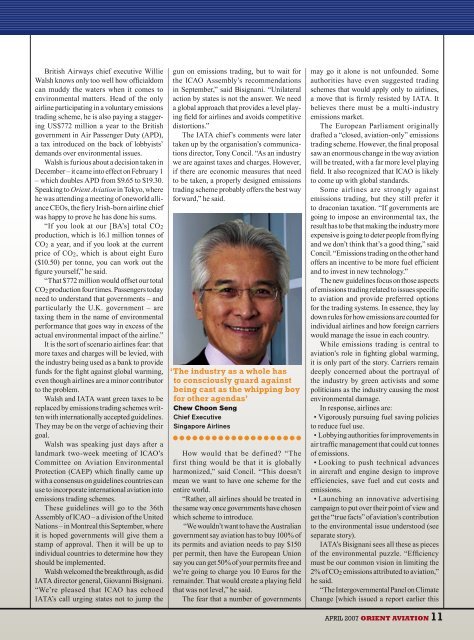

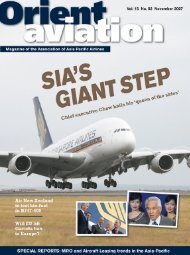
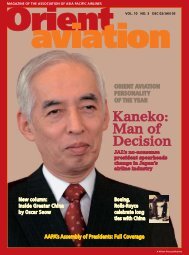
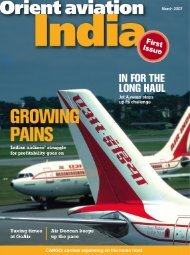
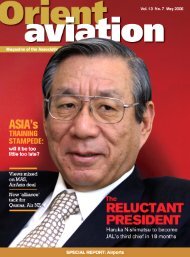
![OAMag-V7N4-Cover [Converted] - Orient Aviation](https://img.yumpu.com/48598575/1/190x255/oamag-v7n4-cover-converted-orient-aviation.jpg?quality=85)
